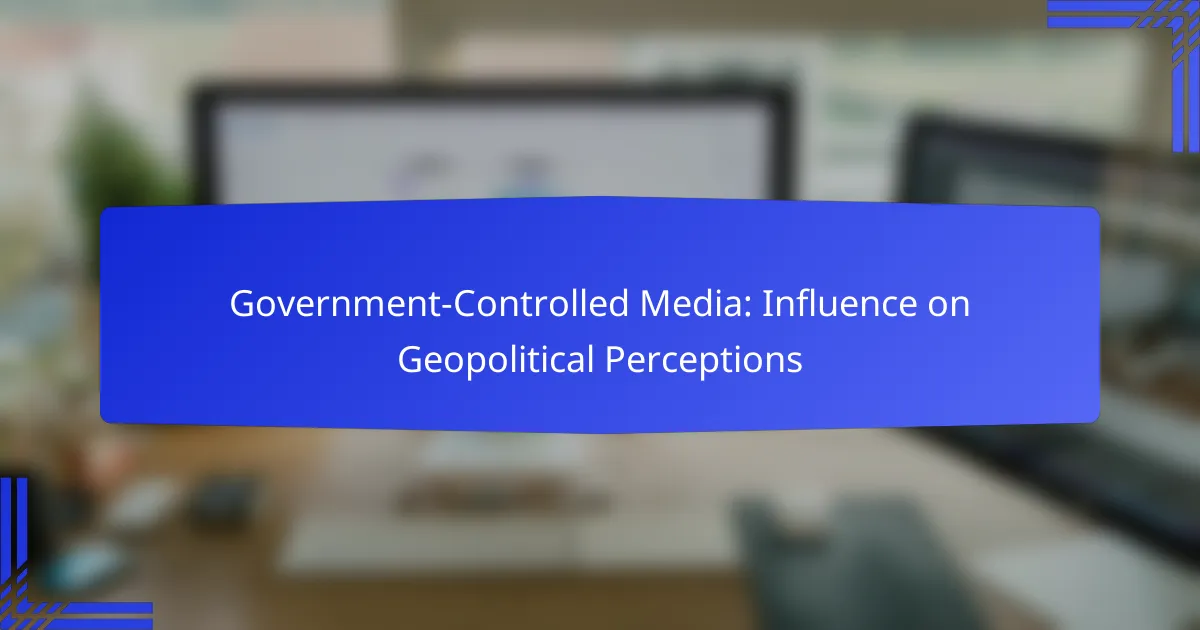Government-controlled media play a crucial role in shaping citizens’ perceptions of geopolitical issues by promoting narratives that reflect state interests. By framing international events in a particular light, these media outlets can distort public understanding and influence national identity, ultimately affecting media coverage of international conflicts and international relations.
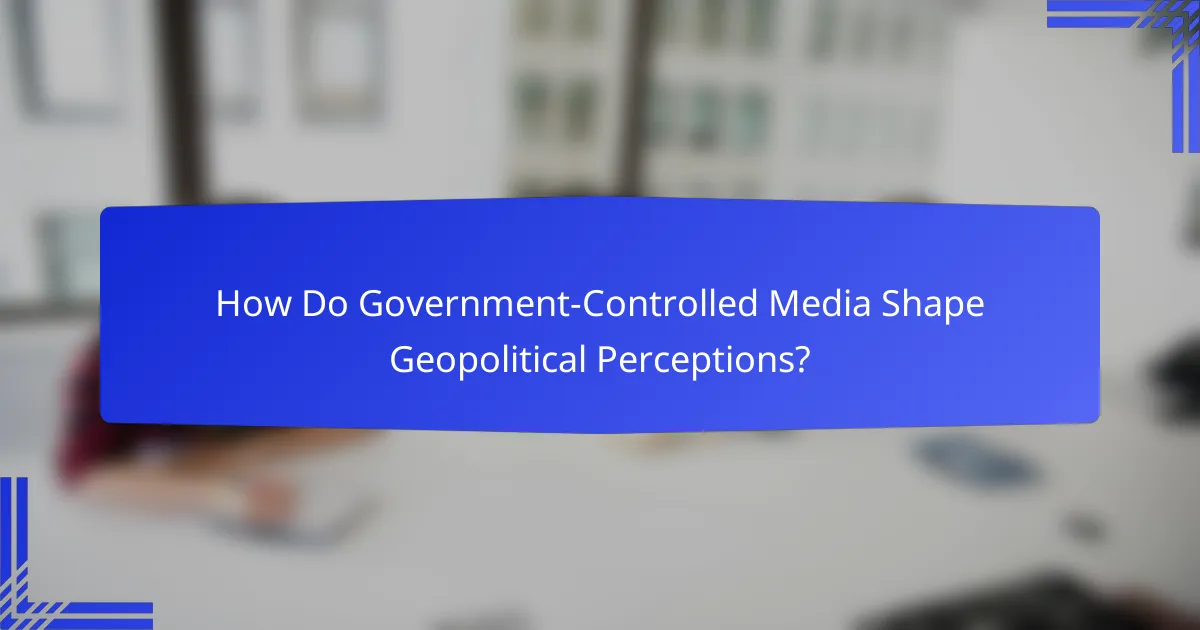
How Do Government-Controlled Media Shape Geopolitical Perceptions?
Government-controlled media significantly influence how citizens perceive geopolitical issues by framing narratives that align with state interests. This control can lead to a skewed understanding of international events and relationships, impacting public opinion and national identity.
Influence on public opinion
Government-controlled media often serve as the primary source of information for citizens, shaping their views on foreign policy and international relations. By selectively presenting news and emphasizing certain narratives, these media outlets can create a biased perception of other countries and their actions.
For example, a state-run broadcaster might portray a neighboring country as a threat, influencing public sentiment to support military spending or aggressive policies. This manipulation can lead to a polarized society where dissenting views are marginalized.
Framing of international events
The framing of international events by government-controlled media plays a crucial role in shaping public understanding. By highlighting specific aspects of a story while downplaying others, these outlets can control the narrative surrounding geopolitical issues.
For instance, during a conflict, a government might focus on the humanitarian crisis caused by an adversary while ignoring its own military actions. This selective framing can lead to a distorted perception of reality, affecting how citizens view their government’s role on the global stage.
Impact on national identity
Government-controlled media contribute to the construction and reinforcement of national identity by promoting a narrative that aligns with state ideology. This can foster a sense of unity and patriotism, but it may also lead to xenophobia and intolerance towards other nations.
In many cases, media portrayals of foreign countries are intertwined with national pride, depicting them as either allies or enemies. This portrayal can influence how citizens see themselves in relation to the world, often leading to a more insular worldview that prioritizes national interests over global cooperation.
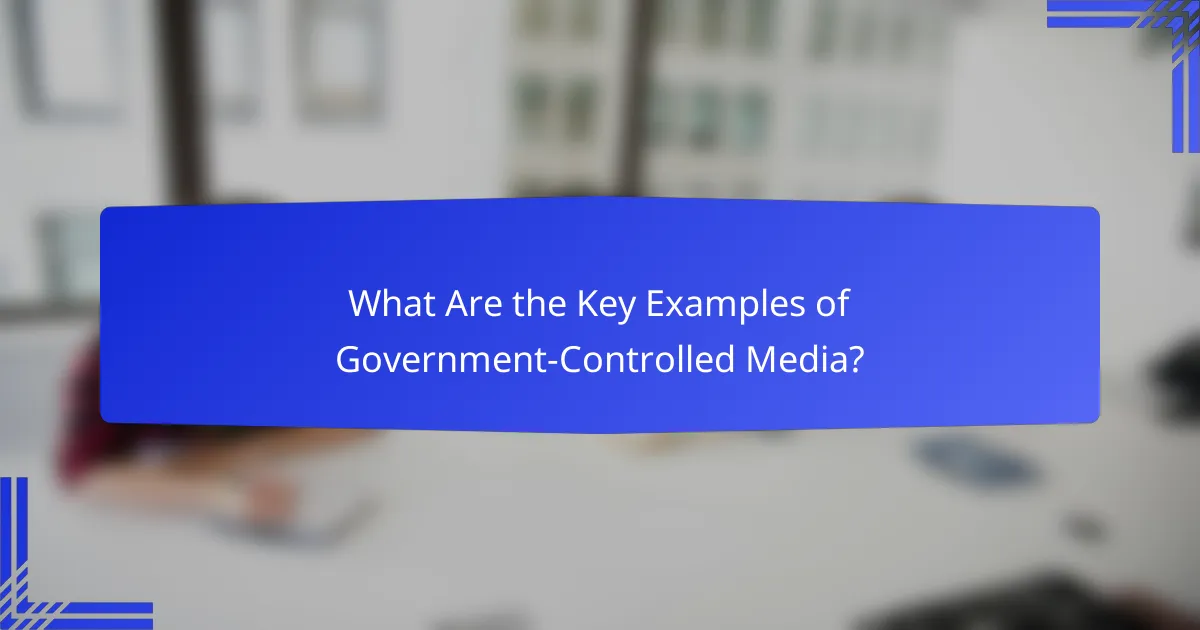
What Are the Key Examples of Government-Controlled Media?
Government-controlled media are outlets that operate under the influence or direct control of a nation’s government, shaping public perception and opinion. Key examples include RT from Russia, CGTN from China, and the BBC from the UK, each serving distinct geopolitical narratives.
RT (Russia Today)
RT, or Russia Today, is a state-funded international television network funded by the Russian government. It aims to provide a Russian perspective on global events, often emphasizing narratives that align with Kremlin interests.
RT has gained a significant audience outside Russia, particularly in Europe and the Americas, by presenting alternative viewpoints on issues like foreign policy and military actions. Its content often contrasts sharply with Western media portrayals, which can influence public perception of Russia.
CGTN (China Global Television Network)
CGTN is the international arm of China Central Television, funded by the Chinese government. It seeks to project China’s views on global issues and promote its cultural and political narratives abroad.
CGTN operates in multiple languages and has expanded its reach through digital platforms. Its programming often highlights China’s achievements while downplaying criticisms, thus shaping international perceptions of the country and its policies.
BBC (British Broadcasting Corporation)
The BBC, while primarily funded by the UK government through a license fee, is known for its editorial independence. However, it is often scrutinized for perceived biases in its reporting, especially regarding sensitive geopolitical issues.
As a globally recognized media outlet, the BBC plays a crucial role in shaping public understanding of international events. Its commitment to impartiality is sometimes challenged by critics who argue that it reflects Western perspectives, which can influence how audiences perceive global conflicts.
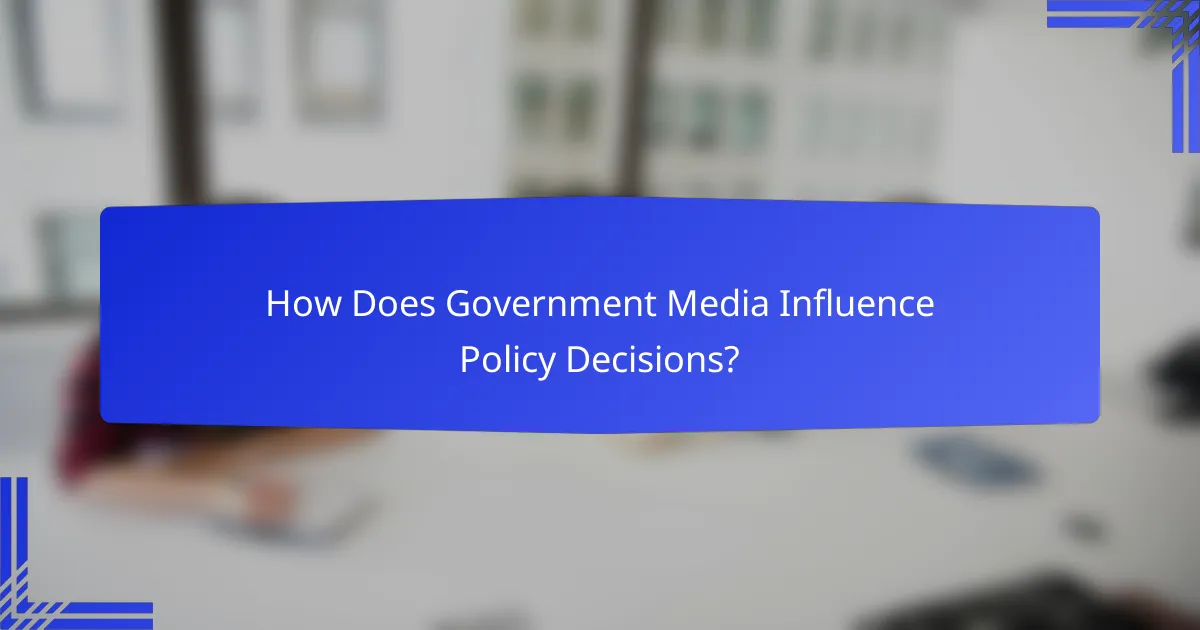
How Does Government Media Influence Policy Decisions?
Government-controlled media significantly shapes policy decisions by framing narratives that align with state objectives. This influence can steer public opinion, guide legislative priorities, and affect international relations.
Shaping legislative agendas
Government media plays a crucial role in shaping legislative agendas by highlighting specific issues that align with political goals. For instance, by emphasizing national security threats, media can push lawmakers to prioritize defense spending or surveillance laws.
Additionally, when government media consistently covers certain topics, it can create a sense of urgency among the public, prompting legislators to act. This can lead to swift passage of laws that may not have received as much attention otherwise.
Impact on diplomatic relations
The portrayal of foreign nations in government media can significantly influence diplomatic relations. Positive coverage of a country can foster goodwill and open avenues for cooperation, while negative portrayals can lead to tensions and conflict.
For example, if a government media outlet consistently depicts a neighboring country as a threat, it may justify aggressive diplomatic stances or military posturing, impacting negotiations and alliances.
Influencing military strategies
Government media can affect military strategies by shaping public perception of military actions and justifying defense policies. When media emphasizes the need for a strong military presence, it can lead to increased funding and support for military initiatives.
Moreover, the narrative around military engagements can influence public support, which in turn affects political leaders’ decisions regarding troop deployments and military interventions. A well-crafted media narrative can rally public backing for military strategies that might otherwise face opposition.
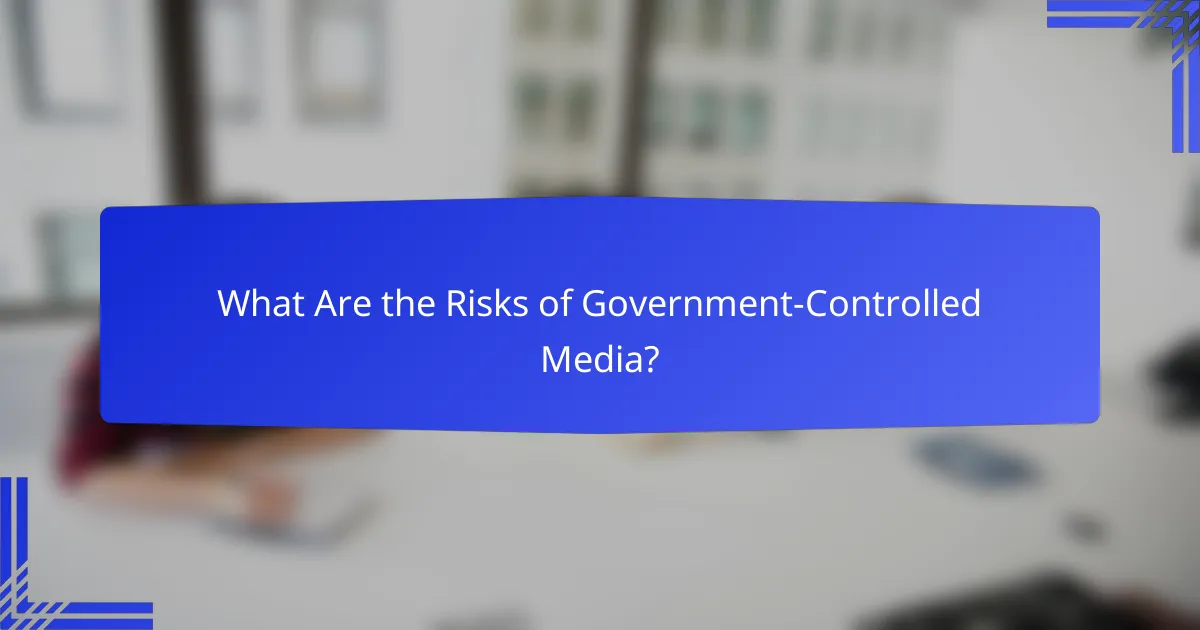
What Are the Risks of Government-Controlled Media?
Government-controlled media presents several risks, including the potential for biased information, limited public discourse, and the shaping of national narratives. These factors can significantly influence geopolitical perceptions and public opinion, often leading to a distorted understanding of both domestic and international issues.
Propaganda dissemination
Government-controlled media often serves as a tool for propaganda dissemination, promoting specific narratives that align with state interests. This can lead to the glorification of government actions while downplaying or ignoring negative consequences. For instance, in some countries, media may highlight military successes while omitting civilian casualties or economic impacts.
Additionally, propaganda can create a sense of national unity or identity, but it can also foster division by portraying opposing views as threats. Audiences may find it challenging to access alternative perspectives, which can further entrench existing beliefs.
Suppression of dissent
Suppression of dissent is a common risk associated with government-controlled media, where critical voices are silenced or marginalized. This can manifest through censorship, where opposing viewpoints are not reported, or through intimidation of journalists and activists who challenge the status quo. In many cases, this leads to a homogenized media landscape that lacks diversity of thought.
Citizens may become unaware of important issues or alternative viewpoints, which can stifle public debate and limit democratic engagement. As a result, the population may be less informed about their rights and less capable of holding their government accountable.
Manipulation of facts
Manipulation of facts is another significant risk, where government-controlled media may present information selectively or inaccurately to shape public perception. This can include altering statistics, misrepresenting events, or using misleading imagery to evoke emotional responses. Such practices can create a skewed reality that misinforms citizens about critical issues.
For example, during political crises, media may focus on government-approved narratives while ignoring grassroots movements or protests. This manipulation can lead to a lack of trust in media sources and a confused public that struggles to discern truth from propaganda.
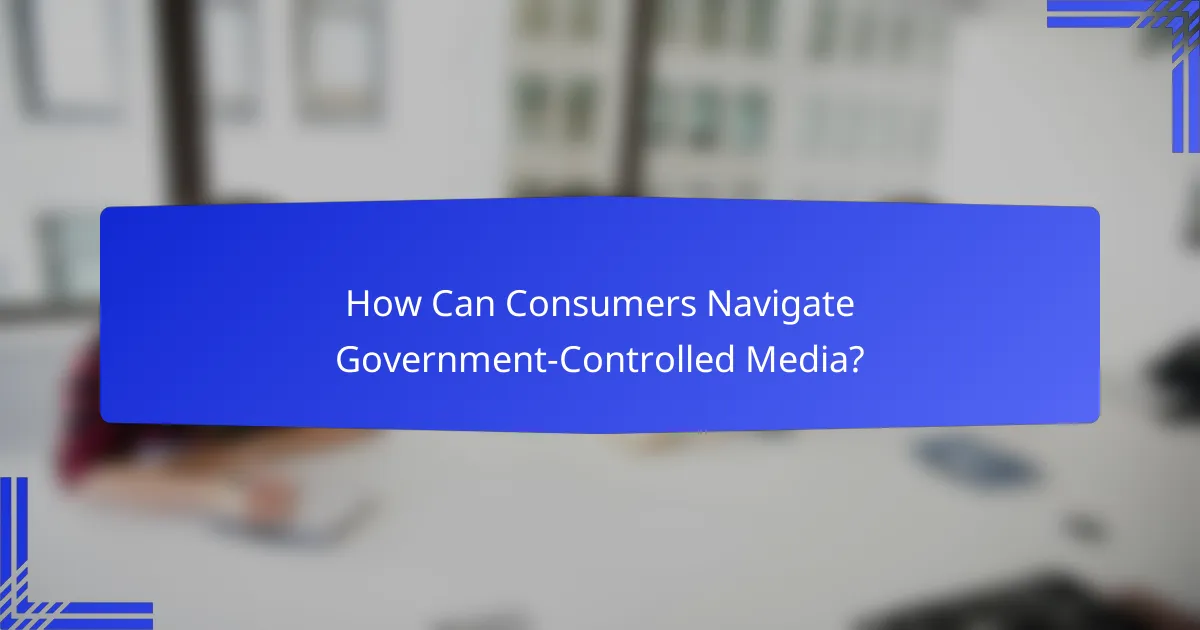
How Can Consumers Navigate Government-Controlled Media?
Consumers can navigate government-controlled media by developing critical media literacy skills and cross-referencing information from diverse sources. Understanding the biases inherent in state-run outlets is essential for forming a well-rounded perspective on geopolitical issues.
Critical media literacy
Critical media literacy involves analyzing and evaluating media content to understand its purpose, context, and potential biases. Consumers should ask questions about who produced the information, what their motives might be, and how the content aligns with or contradicts other sources.
For example, when consuming news from a government-controlled outlet, consider the language used and the framing of issues. Are certain perspectives emphasized while others are downplayed? This awareness can help identify propaganda and enhance overall media comprehension.
Cross-referencing sources
Cross-referencing sources is a vital strategy for verifying information. By comparing reports from government-controlled media with independent news outlets, international agencies, and expert analyses, consumers can gain a more balanced view of events.
Utilize a mix of local and global news sources to capture different angles on a story. For instance, if a government media outlet reports on a political event, check how international media covers the same event. This practice can reveal discrepancies and provide a clearer understanding of the situation.
